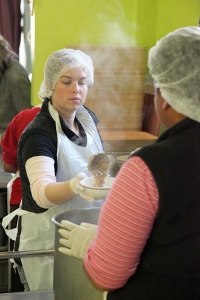
The people of the Central Valley can’t get enough fresh food, even though they live in the nation’s produce basket
Imagine working in one of the vastest agricultural lands in the world; farming and cultivating mass amounts of produce for others, while having little to no food available for you and your own family.
Would you believe that a place that provides a quarter of America’s sustenance has little access to fresh food for its own residents? And that this place is only five hours from San Francisco?
While California’s Central Valley is home to the nation’s largest suppliers of fruit and vegetables, it’s also considered a food desert. Those who live there have to resort to cheap and unhealthy food options because grocery stores are few and far between. Senior Allison Littlefield experienced these harsh realities firsthand of a nearby locale.
From Jan. 7–12, the international studies student visited the cities of Bakersfield, Fresno, Modesto, Delano, and Merced as part of a University Ministry immersion trip. She traveled with three fellow USFers and Luis E. Bazan, who works with the UM and the Center for Global Education to coordinate these programs. The group learned about the current socio-economic issues affecting these communities.
In the case of Central Valley, what the residents need most is access to healthy and affordable food. “This is ironic considering the Central Valley is a huge agricultural land— the food they cultivate feeds the entire world, but they don’t have food to feed themselves.” Littlefield said she walked away from the immersion asking herself, “How does that make sense?”
Having participated in immersions through USF in Peru, El Salvador, and Ecuador, exposure to poor living conditions was nothing new for Littlefield; the fact that people are living like this so close to home astonished her. Experiencing these third world conditions in the first world was nothing short of an eye-opener.
“The most shocking image from the Central Valley immersion were the huge oil fields,” said Littlefield, referring to the polluted vast land in Bakersfield, which is home to acres of oil rigs. “For how environmentally conscious we think Californians are, it’s shocking that just five hours from San Francisco there is so much oil pollution. I didn’t know what was going on in my backyard.”
In Modesto and Bakersfield, dirty air exceeds federal health standards each day, according to The Huffington Post’s “California’s Central Valley Slammed By Record Air Pollution.” The American Lung Association reported that the areas from Stockton to Bakersfield, home to four million people, has the highest level of ozone pollution in the U.S. and asthma rates are three times the national average.
Talking to workers in Central Valley about the immigrant experience and injustices they face was premise of the immersion. The students learned about the Cesar Chavez United Farm Workers movement, which is in place to provide better working conditions and higher wages to farmers and their families. Visiting the families of farmers brought Littlefield an unexpected comparison: “I walked into a couple houses and thought, ‘Wow I’m back in El Salvador.’”
Making sense of it all is one of the goals of immersion trips like this one. “The term ‘service learning’ is misleading,” Littlefield said. “The focus is not going to ‘serve’ people. USF emphasizes solidarity and accompaniment.” USF distances itself from dividing, power structures of education and wealth by focusing more on the learning aspect, she said. Immersion trips to places like Central Valley aim to expose students to the issues inside a community so that they can learn about what people need before deciding how to take action.
“Going in and seeing what a community needs is the first step. You have to know what a community needs first in order to help them,” said Littlefield. She emphasized the importance of talking to organizations that are already in place to help people living in places like central valley, where people are dealing with social and economic issues.
After visiting the Central Valley, Littlefield called for two changes: a more just and sustainable means of producing foods, and spending money on education reform, instead of housing prisoners, to better adjust to children’s diverse learning styles. The immersion trip also brought to Littlefield’s attention the issues surrounding immigration in the United States. “The current immigration system violates human rights and we need to reform the system to allow the people that are here to have rights and establish legal and feasible means of getting citizenship.”
While the image of poverty, pollution, and shortage of food, does not usually bring to mind somewhere only a car ride away, Littlefield’s story is a reminder that these injustices are indeed happening in the United States. The shock of this trip however, gave Littlefield the motivation to create change in not only the Central Valley community, but her own as well: “Looking back I feel very motivated by the organizations that we met there. We spoke with them about how they are creating change within their communities, and I feel that I have people to connect with about making changes in my own.”
To get involved with USF immersion programs, contact Luis E. Bazan at [email protected] or go to http://www.usfca.edu/University_Ministry/Immersion_Programs.




